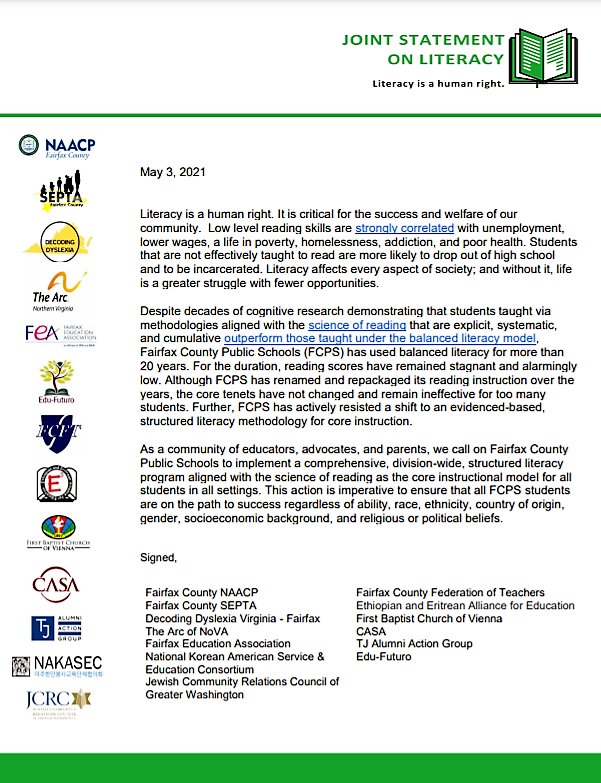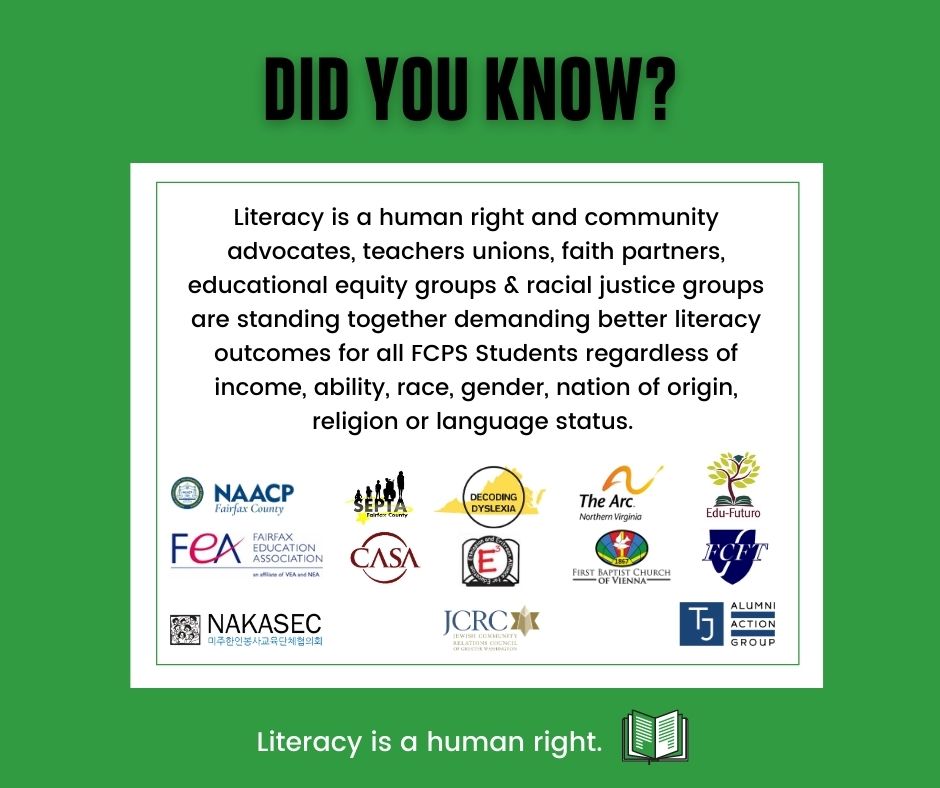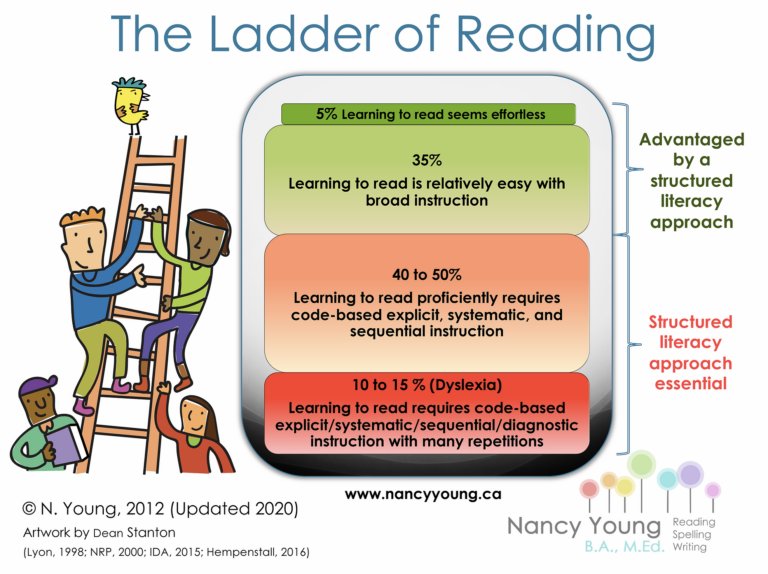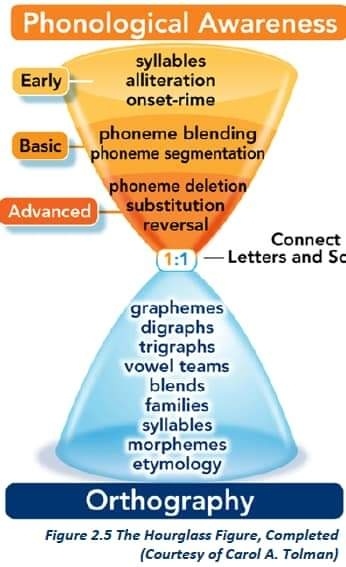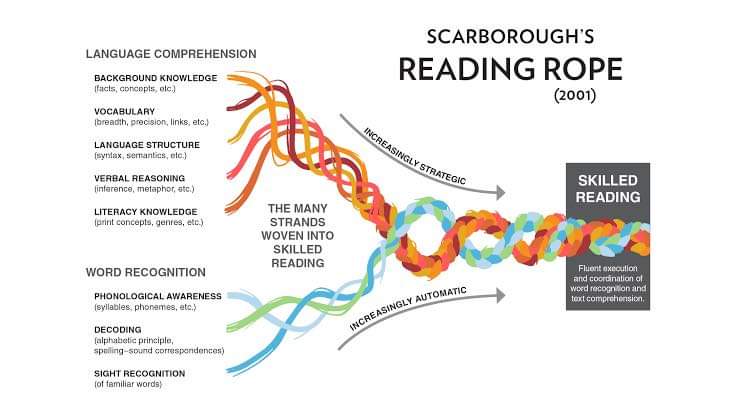@TJAlumniAG joins @FairfaxNAACP @FCSEPTA @DDVA13 @FEA_Fairfax @Edu_Futuro @FCFTcares @nakasec and other community and advocacy partners in calling @FCPSSupt and @fcpsnews to implement a comprehensive, division-wide, structured literacy program for all students in all settings!
@RachnaHeizer @Megan4Schools @Karen4Schools @stella_pekarsky @MelanieForEdu @ElaineTholen @Kaufax4Schools @LJ4fcps @Keys_Gamarra @AbrarOmeish @Ricardy4Mason @KarlFrischFCPS @VASecofEdu @LisaLwilliams13 @leona_smith3 @spresidio @ChiefKeesmith @DrFrancesIvey @drNEKing @GovernorVA
@fcpsaap @FCPSEquity @SujathaHampton @fabsefx @Anthony59968773 @Perryman4VA @ffaxantiracism @fam4va @PatHynes2020 @NoVAEdChat @tarapaigehewan @JamesAlbright63 @pdkintl @JoshuaPStarr @UpsidedownDiane
@kathyburcher @DrJamesLane @JulieStrandlie @MakyaLittle @Malaika1226 @nsbitani
@kathyburcher @DrJamesLane @JulieStrandlie @MakyaLittle @Malaika1226 @nsbitani
Science of reading advocates for the proper utilization of multisensory learning while explicitly teaching phonemes and graphemes: https://youtu.be/uGr-N7A4ZQI ">https://youtu.be/uGr-N7A4Z...
Literacy is a human right. We need better literacy outcomes for all FCPS students regardless of income, ability, race, gender, nation of origin, religion, or language status. NOW IS THE TIME TO ACT! @TJAlumniAG @FairfaxNAACP @FCSEPTA @DDVA13 @FEA_Fairfax @FCFTcares @Edu_Futuro
In our continuing conversation on literacy, I& #39;d like to share some thoughts about how structured literacy benefits the top two groups in this ladder, using my hubby and myself as examples.
Hubby grew up in a Spanish-speaking household in Miami. He& #39;d have been in 1st grade in the mid 80s, that& #39;d be before balanced literacy, when whole language was the predominant reading instruction? So I& #39;d put him in the 5% of those who learned to read w/o explicit instruction.
Hubby loves to read. The phoneme-grapheme correspondence is much more transparent in Spanish than in English. So even though his first exposure to English was in school, my guess is that he& #39;d already developed phonemic awareness and understood the alphabetic principle in Spanish.
Hubby and I met in grad school. He& #39;s a super bright guy with an Ivy League undergrad. So I was taken aback when we started sharing handwritten notes and I realized that he wasn& #39;t a good speller. It& #39;s a good thing spell checker was already a thing when he started writing papers.
Hubby and I started comparing learning styles. He& #39;s strongly both visual and auditory, but what& #39;s been striking for me is his auditory memory. He absorbs tone of voice, inflections, and accents like a sponge & remembers them yrs later (whereas I can& #39;t do accents to save my life.)
When I started teaching ESOL and read about phoneme-grapheme correspondence, hubby& #39;s lackluster spelling started make sense to me -- he was never taught and never learned the less common spelling patterns. He had, however, deduced enough from his experience with Spanish to read.
His experience with French, however, was a different story. French, like English, contains not-readily-discernible phoneme-grapheme correspondence. But his French teacher explicitly taught phonics. That was the first time he received explicit reading instruction--as a teenager.
He& #39;s an excellent speller in Spanish. In English, he was a better reader than his peers but a poorer speller. Luckily, technological advancements--and teachers familiar with Spanish, or were Spanish-speakers themselves--kept his poor spelling from holding him back academically.
I, on the other hand, grew up in a Mandarin-speaking household and also spoke Hakka (my mom& #39;s native tongue) and understood Minan (often referred to as Taiwanese), my dad& #39;s native tongue and my parent& #39;s secret language with each other (until they realized I had learned it!)
I was a voracious reader. By 6th grade, I was reading essay anthologies written for adult audiences. It was a biography of Marie Curie (written for adults but she was sure I could read) that my mom picked up for me when I was in 3rd grade that sparked my interest in science.
Before 7th grade, all of my reading was done in Chinese. Chinese is not alphabetic. Mandarin-speaking children are explicitly taught a distinct phonetic transcription system to aid reading before/while they acquire enough characters to read and write. http://blog.tutorming.com/expats/why-there-is-no-chinese-alphabet">https://blog.tutorming.com/expats/wh...
As the link above notes, Chinese intelligentsia at the turn of the 20th century lamented low literacy rates and felt that written Chinese was elitist. The phonetic system currently taught in Taiwan was devised by Chinese intelligentsia exiled to Japan, inspired by Japanese Kana.
As Japan relinquished Taiwan (ceded to Japan for 50 years, all my grandparents received schooling in Japanese), this phonetically annotated newspaper was founded to aid Mandarin ed as part of Taiwanese return to the motherland. It eventually transitioned to a children& #39;s paper.
The point of the lengthy digression is say that when I first encountered English when we moved to FCPS in 7th grade, I had no expectation of phoneme-grapheme correspondence in English because of the lack of it in Chinese. And I certainly was not taught it in my ESL classes.
I honestly don& #39;t know how I learned to read. I don& #39;t think of myself as a particularly visual learner; I guess however I learned to read Chinese, maybe faster b/c I was 12 & desperate to read (I sat with an English-Chinese dictionary and "Where Is Spot?" in 7th grade homeroom).
But I do think prior success at reading at college-level in a non-alphabetic language, being already orally bi-/multilingual (in combination with forced social/literary isolation & drive to not fall behind my younger brother) gave me confidence that I could learn to read English.
Also, I did already have phonemic awareness, concept of morphemes (units of meaning), and excellent reading comprehension in Mandarin/ written Chinese. And like I said, I was desperate to read and write as well in English as well as I could in Chinese. https://assets.logicofenglish.com/downloads/logic-of-english-reading-research.pdf">https://assets.logicofenglish.com/downloads...
I took Russian in high school. Like hubby, that was the first time I was taught the alphabetic principle--as a teenager. "[Russian orthography is] sufficiently regular and predictable", so to this day (25 years later) I can still sound out Russian words. https://www.researchgate.net/publication/241570834_Russian_orthography_and_learning_to_read">https://www.researchgate.net/publicati...
That does not mean I learned how to read in Russian. Beyond teaching the sounds of the letters, my Russian teacher obviously was all about the whole language approach. She never spoke a single word to us in English, and our (clearly outdated textbooks) also had no English at all.
As I now know, the reason I didn& #39;t learn to read in Russian was the lack of both comprehensible input and intentional practice. Alas, one period a day does not constitute immersion. Note, though, that hubby became fluent in French with one period a day. https://elearningindustry.com/total-immersion-vs-comprehensible-input-part-1">https://elearningindustry.com/total-imm...
So, how would structured literacy help students who learned to read with balanced literacy/without explicit instruction? A child can start reading if they intuit enough, but that doesn& #39;t necessarily mean they will figure out all the rest of the steps on their own.
Different children are typically missing different steps/components. Without breaking the process down to small digestible units so that the teacher & student can recognize the missing steps, the students may be competent readers at an earlier age but not become skilled readers.
Even if they are skillful readers like my husband and me, one& #39;s attitude is shaped by the learning process. Knowing there is a predictable order is reassuring. Demystifying the learning process shows to high-performing children that everyone can learn with practice and support, &
... and even if you already know how to do it, you may still learn or experience something new. Learning is never finished, and there is always more depth. It& #39;s not about hurrying on to the next thing. There is often value in looking at things from a new angle, a new perspective.
And even mastery of a skill does not mean appreciation for the beauty of the whole. As a former high-achieving student, I wish my education had not been siloed and compartmentalized, that my teachers weren& #39;t just satisfied that I could produce the right answers.
How you get there matters. The experience of spotting/filling gaps in one& #39;s knowledge/skill is valuable & transferrable. Developing habits to explicitly look for & apply patterns has far reaching impact. Knowing that language is manipulatable is key to becoming an artful writer.
Breaking decoding/encoding down to bite-size steps gives even good readers experience of success, and mastery is the beginning of creativity. When kids are encouraged to observe & experiment with (de)constructing words they develop agency, intuition, and confidence with language.
All of this, of course, depends on how the reading instruction is implemented day in and day out in the classroom. But teachers and children need the tools in their toolbox. And the social-emotional learning to appreciate a collaborative learning process. https://www.ednc.org/2021-04-07-teacher-training-science-reading-literacy-phonics-phonemics-school-classroom-instruction/?fbclid=IwAR2IkhTHQPWCFgFbjR9O1S5ncCxIc5pnwsFBFo4l1YXA5qZFBlzFHIajuSE">https://www.ednc.org/2021-04-0...
Ultimately, what it comes down to for me is 1) students have to feel safe and that things are predictable to learn effectively; 2) comprehensible input and intentional practice (including multisensory stimulation) are key. Structured literacy intentionally addresses these needs.

 Read on Twitter
Read on Twitter